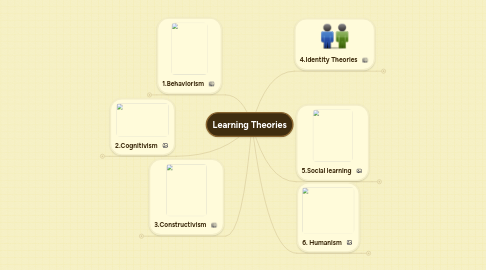
1. 1.Behaviorism
1.1. Summary and Main idea
1.1.1. A principle of “stimulus-response.”
1.1.2. caused by external stimuli
1.1.3. C.a learner is essentially passive
1.1.4. behavior is shaped through positive reinforcement or negative reinforcement
1.1.5. Positive indicates the application of a stimulus
1.1.6. Negative indicates the withholding of a stimulus
1.2. Originators and important contributors
1.2.1. John B.Watson
1.2.2. Ivan Pavlov, B.F. Skinner
1.2.3. E. L. Thorndike (connectionism)
1.2.4. Tolman (moving toward cognitivism)
1.3. keywords
1.3.1. Classical conditioning (Pavlov)
1.3.2. operant conditioning (skinner)
1.3.3. Stimulus-response (S-R)
2. 2.Cognitivism
2.1. Important contributors
2.1.1. Vygotsky
2.1.2. Piaget
2.1.3. Dewey
2.1.4. Vico
2.1.5. Rorty
2.1.6. Bruner
2.2. Keywords
2.2.1. Schema
2.2.2. schemata
2.2.3. information processing
2.2.4. symbol manipulation
2.2.5. information mapping
2.2.6. mental models
2.3. Main Idea
2.3.1. learner as an information processor,like a computer
3. 3.Constructivism
3.1. Summary and Main idea
3.1.1. learning is an active, constructive process
3.1.2. learner as an information constructor
3.1.3. New information is linked to prior knowledge, mental representations are subjective
3.2. Important contributors
3.2.1. Vygotsky
3.2.2. Piaget
3.2.3. Dewey
3.2.4. Vico
3.2.5. Rorty
3.2.6. Bruner
3.3. Keywords
3.3.1. Learning as experience
3.3.2. Activity and dialogical process
3.3.3. Problem Based Learning (PBL)
3.3.4. Anchored instruction
3.3.5. Vygotsky’s Zone of Proximal Development (ZPD)
3.3.6. Cognitive apprenticeship (scaffolding)
3.3.7. Inquiry and discovery learning
4. 4.Identity Theories
4.1. Self-Theories (Dweck)
4.1.1. Entity theory:view intelligence as being an unchangeable, fixed internal characteristic
4.1.2. Incremental theory:intelligence is malleable and can be increased through effort
4.2. Identity Status Theory (Marcia)
4.2.1. identity status
4.2.2. diffusion
4.2.3. foreclosure
4.2.4. moratorium
4.2.5. achievement
4.3. Erikson's Stages of Development
4.3.1. Erikson’s stages
4.3.2. psychosocial
4.3.3. development
5. 5.Social learning
5.1. Main Idea
5.1.1. social interaction precedes development
5.1.2. consciousness and cognition are the end product of socialization and social behavior
5.2. Important contributors
5.2.1. Lev Vygotsky
5.3. Key Words
5.3.1. Zone of Proximal Development (ZPD)
5.3.2. More Knowledgeable Other (MKO)
6. 6. Humanism
6.1. Main Idea
6.1.1. a paradigm/philosophy/pedagogical approach
6.1.2. learning is viewed as a personal act to fulfill one’s potential
6.2. Important contributors
6.2.1. Abraham Maslow
6.2.2. Carl Rogers
6.2.3. Malcolm Knowles
6.3. Key Words
6.3.1. self-actualization
6.3.2. teacher as facilitator
6.3.3. affect
